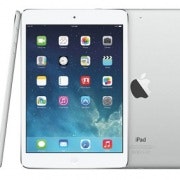Quickflix sets its sights on Apple TV
While Steve Jobs initially described Apple TV as a "hobby", it's turned into big business for the tech giant -- offering the iTunes store a foothold in our lounge rooms. Rather than purely acting as a front for the iTunes store, Apple TV improves its value proposition by offering easy access to a wide range of third-party video services. Well, at least in the US. It's still a rather sad state of affairs in Australia, although that is set to change thanks to Quickflix.
YouTube was built into Apple TV at launch, with Netflix and Hulu added over the next few years. The library of apps continues to grow, with heavy hitters such as EPSN, HBO and Disney also on board. Apple seems determined to win over US 'cable cutters' who are keen to abandon their home pay TV subscription and source the bulk of their viewing online.
The latest Apple TV firmware update adds the Lifestyle, A&E and History channels. Of course you won't see these apps on an Australian Apple TV -- nor will you see the likes of Netflix, HuluPlus and HBO Go, not unless you dip into the settings and switch across to the US iTunes store. Only a handful of Apple TV's subscription services are open to Australians: the NBA, NHL and Major League Baseball from the US, as well as KorTV from Korea.
To be honest, it's not that hard for Australians to bluff their way into US services like Netflix using Apple TV. It's actually one of the easiest ways to get Netflix on an Australian television because, unlike the Google Chromecast or a Roku player, you don't need to run a Virtual Private Network to trick Apple TV into thinking you're in the US. You can use a simple DNS-based work-around, such as Unblock US or UnoTelly.
Geo-dodging isn't that hard, but if Apple really is so keen to win over cable cutters, why is there such a dearth of video content legitimately available to Apple TV owners in other countries? You can't really blame Apple for the fact that Netflix and HuluPlus aren't available to Australians. But if those services have earned a place on Apple TV for US viewers, why aren't local major players like Quickflix, Foxtel Play, Bigpond and iView available to Australians yet?
The lack of local content is partly because Apple TV still treats non-US viewers as an afterthought, stemming from that initial "hobby" mentality. If Netflix is legally available in your country then you're in luck -- the app shows up when you're connected to your country's iTunes store. But Apple hasn't gone out of its way to court non-US video services and so only a handful have made the leap -- all in the last 18 months.
Switch to the UK iTunes store and you'll see Sky Sports Now TV and Sky News, the latter of which is also on the Irish iTunes store. There's still no sign of BBC iPlayer on Apple TV even though it's coming to Google's Chromecast. The French can watch CanalPlay, the Germans can tap into Watchever and the Swedes recently gained access to TV4. That's it for non-US services, although Australia's Quickflix aims to join this select group later this year.
"Until now Quickflix has been busy focusing on smart TVs and game consoles," says Quickflix founder and chief executive Stephen Langsford.
"Our development team have had a full slate of device platforms to build for -- including XboxOne, which is due to go live over coming weeks, and Google Chromecast. But we've had a lot of customers asking us to make Quickflix available on Apple TV. We've prioritised this now and we expect to be on Apple TV in 2014. I think ultimately Apple has the same philosophy as it does with iPhones and iPads -- they're devices that can support other popular apps."
So why haven't more non-US video services embraced Apple TV over the years? It's tempting to accuse Apple of simply wanting to ride the coattails of the industry giants while not giving smaller competitors a leg-up. You could argue that Netflix in the US and Sky in Britain are simply too big to ignore, and bringing them on board expands Apple TV's horizons.
Meanwhile, in most other countries Apple TV has launched into a fledgling streaming video market where Apple has ambitions to become the dominant player. In Australia, Apple can survive without Quickflix and Foxtel Play, and may be reluctant to give them a shot in the arm by adding them to Apple TV.
Quickflix's Langsford insists this is not the case: "We've already had discussions with Apple and we understand there is no particular impediment to our subscription streaming service being available on the platform," he says. "Apple is open to other content players but that is negotiated; meanwhile other content players obviously have their own set-top box strategy."
While Langsford obviously wants to be diplomatic, it's difficult to accept the lack of third-party services until recently is merely a matter of them prioritising other platforms. It seems likely that Apple has begun taking a more proactive approach to content deals as competitors like Google and Amazon expand their reach.
Amazon's Fire TV has recently launched in the US while Google's Chromecast has arrived in Britain and is reportedly destined for Australia. The Australian Chromecast may launch in partnership with Telstra, but it's unlikely Quickflix is the only other local video service eyeing off Google's tiny media player.
There are already reports of Apple overhauling Apple TV hardware and negotiating pay TV-style packages with Time Warner Cable, but the fight is now on a global stage. Apple likes to play its cards close to its chest, but it looks like 2014 will be the year Apple TV finally shakes off the hobby tag and takes on the world. Australians looks set to have a front row seat.
















